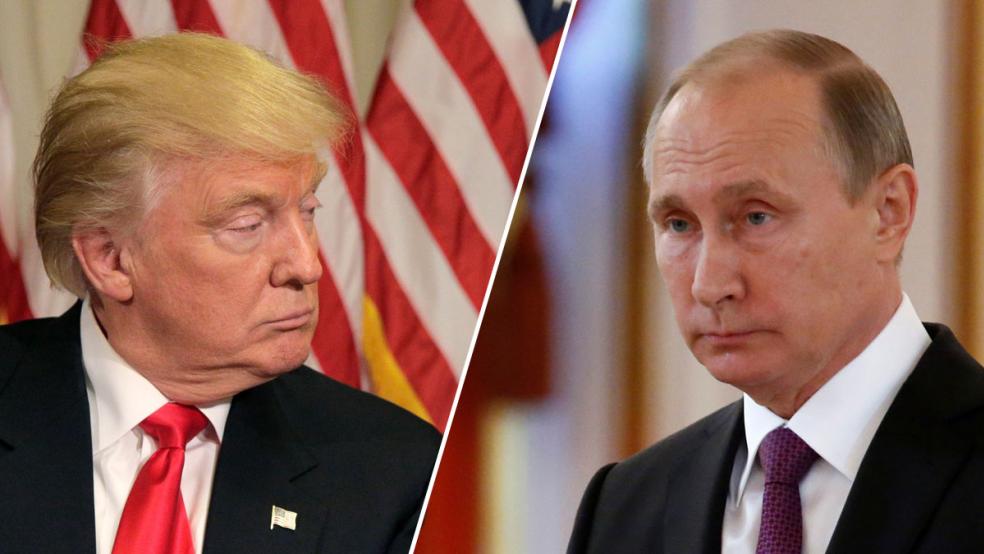It seems that a day doesn’t go by without Donald Trump or one of his associates contradicting themselves about the relationship between his presidential campaign and the Russian government. On Thursday, just hours after Attorney General Jeff Sessions was forced to recuse himself from any investigation of the campaign’s ties to Russia, another Trump adviser revealed that Trump and his team had been more aggressive in inserting Russia-friendly policy planks into the Republican Party platform than they previously admitted.
Over the summer, as the Republicans were preparing to formally nominate Trump as their presidential candidate, controversy broke out over a proposed change to the language in the party’s platform with regard to Ukraine. A member of the platform committee proposed an amendment that expressed support for the provision of lethal weapons to the government in Kiev, which was then fighting a Russia-backed insurgency on the heels of Moscow’s invasion of Crimea.
Related: Sessions Recusal Replaces One Set of Questions with Another
Reports at the time indicated that Trump’s representatives at the meeting moved quickly to water down the language, but the campaign denied it forcefully. Campaign chairman Paul Manafort said on Meet the Press that he didn’t even know there was a debate about it. “I didn’t even hear of it until after our convention was over,” he insisted.
Pressed on the matter he added, “It absolutely did not come from the Trump campaign. And I don’t know who everybody is, but I guarantee you it was nobody that was on the platform committee –“
“So nobody from the Trump campaign wanted that change in the platform?” asked host Chuck Todd.
“No one. Zero,” said Manafort.
In an interview with ABC after the convention, Trump seemed to confirm that he was not party to his campaign’s discussions about the GOP’s position on Ukraine. “I wasn't involved in that. Honestly, I was not involved."
Turns out, though, that not only did someone on the Trump campaign want to soften language toward Russia, but that somebody may have been Donald Trump himself.
According to CNN reporter Jim Acosta, former Trump national security adviser J.D. Gordon said on Thursday that last March, at a meeting in Washington months before the Republican convention, Trump said that he “didn’t want to go to World War III over Ukraine” and said that he favored a much lower level of support for the government in Kiev, one that did not involve providing weapons.
Related: Demands for a Special Counsel to Investigate Trump’s Russia Ties Just Got Louder
Gordon said that he specifically advocated for the change in platform language that was ultimately inserted, and did so because he believed it was what Trump had requested.
As recently as January, Gordon told Business Insider that Trump and Manafort were not engaged in policy discussions at that level of detail. In an email Friday, he told the website that he did not see his comments as contradictory, and that the apparent disconnect between his January statements and CNN’s report was a matter of “semantics.”
The CNN story comes on the heels of fresh reports of meetings between Trump associates, including Gordon, and Russian Ambassador Sergei Kislyak. Gordon and Trump advisers Carter Page and Walid Phares reportedly met with Kislyak during the Republican convention at an event in Cleveland. In addition, Trump’s son-in-law and close adviser Jared Kushner and former National Security Adviser Michael Flynn met with Kislyak in Trump Tower in December.
Flynn later resigned his position with the White House after lying to others in the administration about the extent of his contacts with Kislyak.
To be clear, there is nothing necessarily wrong about any of the meetings or contacts that Trump associates have had with the Russian ambassador. Flynn might have crossed a line if he interfered with the Obama administration’s efforts to conduct foreign policy before Trump was sworn in. But for the most part, the meetings with Kislyak could easily be dismissed as business-as-usual interactions between foreign policy advisers and professional diplomats.
Related: Trump Has a New Reason for His Military Buildup: Job Creation
What makes the matter so puzzling, and to some minds even troubling, is apparent resistance among members of the Trump administration to come clean about the frequency and content of their discussions with Russia and their efforts to promote policy positions friendly to the Kremlin.
If nothing else, it’s providing a source of free and seemingly unlimited ammunition to the administration’s critics. Being vague or untruthful about Russia has already cost the administration one National Security Adviser, and now Democrats are calling for the resignation of Attorney General Sessions. Much more of this and it could become a distraction so overwhelming that it inhibits the administration’s ability to effectively govern.





